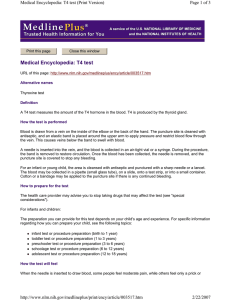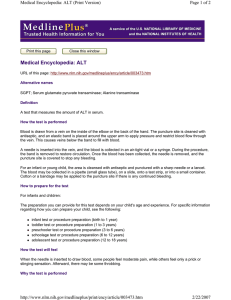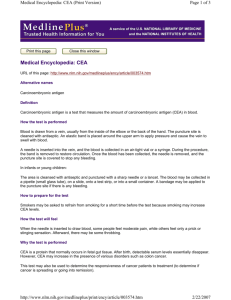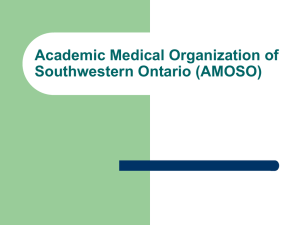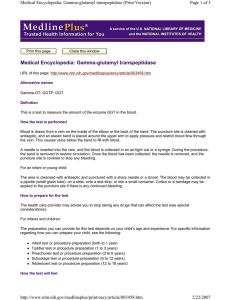Medical Encyclopedia: Alpha fetoprotein Page 1 of 3
advertisement
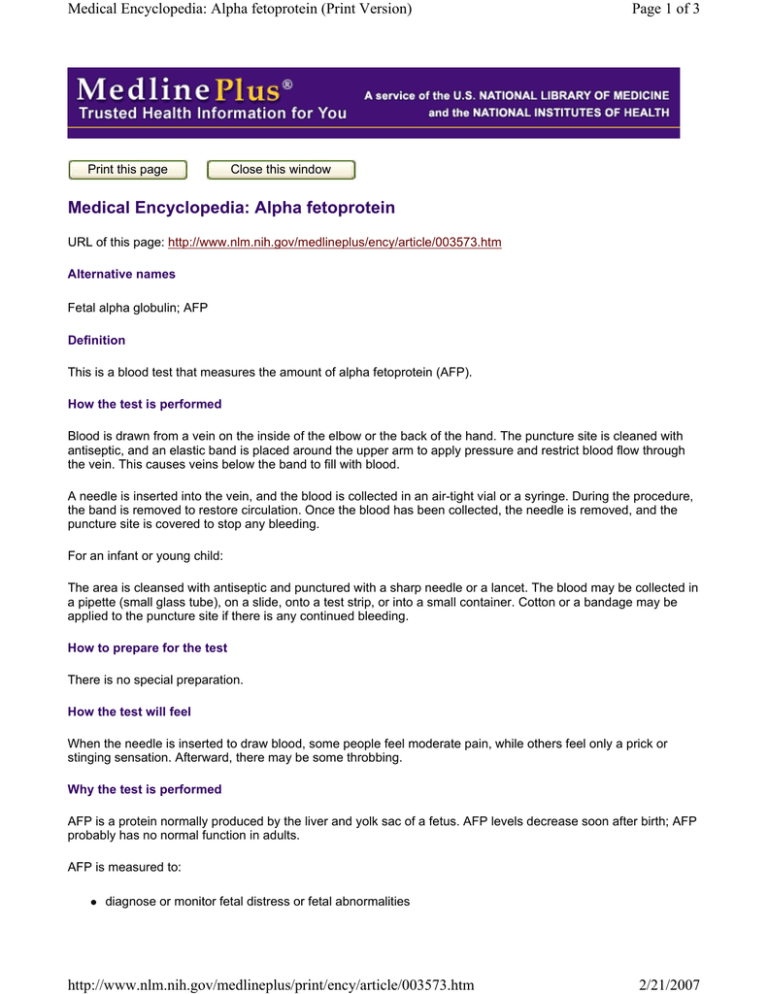
Medical Encyclopedia: Alpha fetoprotein (Print Version)
Print this page
Page 1 of 3
Close this window
Medical Encyclopedia: Alpha fetoprotein
URL of this page: http://www.nlm.nih.gov/medlineplus/ency/article/003573.htm
Alternative names
Fetal alpha globulin; AFP
Definition
This is a blood test that measures the amount of alpha fetoprotein (AFP).
How the test is performed
Blood is drawn from a vein on the inside of the elbow or the back of the hand. The puncture site is cleaned with
antiseptic, and an elastic band is placed around the upper arm to apply pressure and restrict blood flow through
the vein. This causes veins below the band to fill with blood.
A needle is inserted into the vein, and the blood is collected in an air-tight vial or a syringe. During the procedure,
the band is removed to restore circulation. Once the blood has been collected, the needle is removed, and the
puncture site is covered to stop any bleeding.
For an infant or young child:
The area is cleansed with antiseptic and punctured with a sharp needle or a lancet. The blood may be collected in
a pipette (small glass tube), on a slide, onto a test strip, or into a small container. Cotton or a bandage may be
applied to the puncture site if there is any continued bleeding.
How to prepare for the test
There is no special preparation.
How the test will feel
When the needle is inserted to draw blood, some people feel moderate pain, while others feel only a prick or
stinging sensation. Afterward, there may be some throbbing.
Why the test is performed
AFP is a protein normally produced by the liver and yolk sac of a fetus. AFP levels decrease soon after birth; AFP
probably has no normal function in adults.
AFP is measured to:
z
diagnose or monitor fetal distress or fetal abnormalities
http://www.nlm.nih.gov/medlineplus/print/ency/article/003573.htm
2/21/2007
Medical Encyclopedia: Alpha fetoprotein (Print Version)
z
z
Page 2 of 3
diagnose some liver disorders
screen for and monitor some cancers.
During pregnancy, this test, along with the examination of amniotic fluid (amniocentesis), can help detect fetal
spina bifida or other defects of the fetus' neural tube associated with elevated levels of AFP.
Normal Values
Males or nonpregnant females: less than 40 micrograms/liter
What abnormal results mean
Greater-than-normal levels of AFP may indicate:
z
z
z
z
z
cancer in testes, ovaries, biliary (liver secretion) tract, stomach, or pancreas
cirrhosis of the liver
liver cancer
malignant teratoma
recovery from hepatitis
During pregnancy, increased levels of AFP may indicate:
z
z
fetal defects
{ spina bifida
{ anencephaly
{ omphalocele
{ tetralogy of Fallot
{ duodenal atresia
{ Turner's syndrome
intrauterine death (usually results in a miscarriage)
Additional conditions under which the test may be performed:
z
testicular cancer
What the risks are
The risks associated with having blood drawn are:
z
z
z
z
z
excessive bleeding
fainting or feeling lightheaded
hematoma (blood accumulating under the skin)
infection (a slight risk any time the skin is broken)
multiple punctures to locate veins
Special considerations
Veins and arteries vary in size from one patient to another and from one side of the body to the other. Obtaining a
blood sample from some people may be more difficult than from others.
Update Date: 3/2/2006
http://www.nlm.nih.gov/medlineplus/print/ency/article/003573.htm
2/21/2007
Medical Encyclopedia: Alpha fetoprotein (Print Version)
Page 3 of 3
Updated by: Daniel R. Alexander, M.D., Department of Internal Medicine, St. Mary's Hospital, Leonardtown, MD. Review provided by VeriMed
Healthcare Network.
A.D.A.M., Inc. is accredited by URAC, also known as the American Accreditation HealthCare Commission (www.urac.org). URAC's
accreditation program is the first of its kind, requiring compliance with 53 standards of quality and accountability, verified by
independent audit. A.D.A.M. is among the first to achieve this important distinction for online health information and services. Learn
more about A.D.A.M.'s editorial process. A.D.A.M. is also a founding member of Hi-Ethics (www.hiethics.com) and subscribes to the
principles of the Health on the Net Foundation (www.hon.ch).
The information provided should not be used during any medical emergency or for the diagnosis or treatment of any medical condition. A
licensed physician should be consulted for diagnosis and treatment of any and all medical conditions. Call 911 for all medical emergencies.
Adam makes no representation or warranty regarding the accuracy, reliability, completeness, currentness, or timeliness of the content, text or
graphics. Links to other sites are provided for information only -- they do not constitute endorsements of those other sites. Copyright 2005,
A.D.A.M., Inc. Any duplication or distribution of the information contained herein is strictly prohibited.
http://www.nlm.nih.gov/medlineplus/print/ency/article/003573.htm
2/21/2007
